News & Events | About PKU News | Contact | Site Search
A special edition of PKU News in commemorating the 113th anniversary of Peking University.
Peking University, Apr. 29, 2011: "When is the Anniversary Day of Peking University?" "May 4, of course, the Youth Day."
Most people may respond without hesitation because PKU today recognizes May 4 as the official anniversary day. However, several other dates could be added to that answer, as that the university has always kept in step with China's modern history.
I. PKU without official anniversary day (1898-1916)
On December 31, 1898, the Imperial University of Peking, or Jingshi Daxuetang opened. The university — both the first modern national institution for higher learning and the center of China's educational administration — is recognized as the only surviving legacy of the "Hundred Days' Reform" in late Qing Dynasty (1644-1911).
On July 3, 1898, Emperor Guangxu approved a report to implement the Imperial University of Peking and to draft its charter. Sun Jianai, a senior Chinese official, was appointed “guanli daxuetang shiwu dachen,” or the (education) minister for the imperial university's affairs.
The memorial to the emperor was submitted by Zongli Yamen, a central goverment office in late Qing dynasty, similar to the US Department of State.
Earlier on February 15, 1898, Emperor Guangxu authorized the establishment of the university in his edict regarding Censor Wang Pengyun's memorial:
The Imperial University of Peking, which the ministers have been petitioning several times to launch, is hereby approved and should be started immediately; its charter in detail be soundly discussed and proposed by the grand minister of state (junji dachen) along with the first minister of Zongli Yamen.
The initiative, incubated since China's failure in the First Sino-Japanese War (1894-95), was also highlighted in a January proposal to launch a nationwide system of modern education by Kang Youwei, later as head of Emperor Guangxu's reform team.
After the emperor issued his first reform decree in June, Liang Qichao, another leading Chinese reformist, drafted the university's charter, the first of its kind in China. The charter referred to the education systems in Japan and Western countries. It also proposed as the institution's educational principle "Zhongxue wei ti, Xixue wei yong," or Chinese knowledge as body and Western learning for use, the most popular motto since the Chinese empire's opening-up and self-strengthening movement.
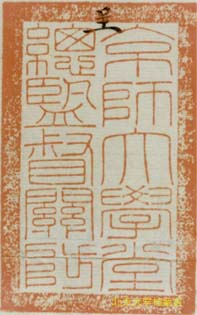
Seal of the Imperial University of Peking (File photo/PKU Archives)
Empress Dowager Cixi, with the army among her conservative backers, mounted a coup d’état and imprisoned the emperor on September 21. All the reform edicts during the 104 days were repealed except the initiative for the university, as it was prepared "quite early." The guidelines and course contents were significantly changed from what was in the original plan. The scale of the newly founded higher education institution was considerably smaller: "no more than 100 students and 100 classrooms."
Prior to the opening, the medical division of the university started operation in November.
On August 9, 1898, Emperor Guangxu appointed William A. P. Martin, an American missionary and senior scholar in China studies, as the first Xixue zongjiaoxi (general educator for Western learning, or de facto President) of the Imperial University of Peking.
"As [the prospective students, mainly mandarins] of the Shixueguan (official-training college) have gone through the imperial civil service system, they are already competent in Chinese learning (Zhongxue); They attend the university specifically to study Western lore," Minister Sun Jianai's report to the emperor read. The document was ratified on the same day of the appointment.
II. December 17 (1917-51)
However, shortly after its inauguration, the Imperial University of Peking was closed down as a result of the Boxer Rebellion in 1900. On December 17, 1902, it opened again after a two-year halt and months of restoration efforts. That was the reason, as most of the relevant archives indicated, the official anniversary day till 1953 fell on December 17.
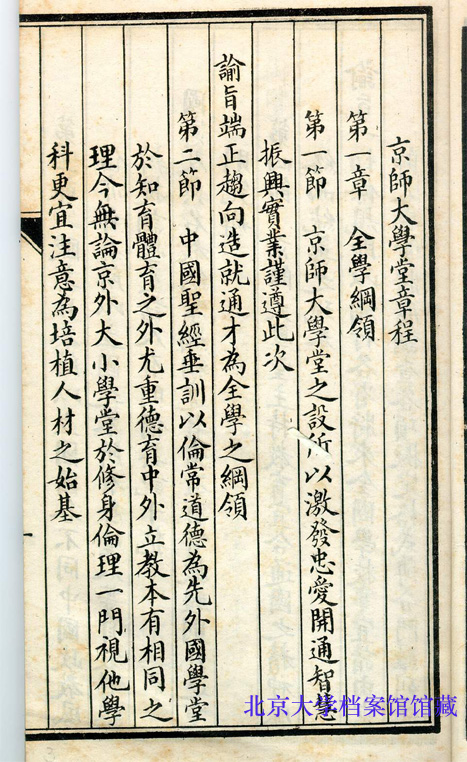
Authorized Charter of the Imperial University of Peking, 1902 (File photo/PKU Archives)
After the Xinhai Revolution of 1911 that brought the Republic of China (ROC), the imperial university — at least its name — seemed out of place in the new republic.
The ROC Ministry of Education's proposal to change the name from Jingshi Daxuetang to "Beijing Daxuexiao" (Government University of Peking, literally "Peking University") was approved on May 3, 1912, with renowned thinker, translator, and educator Yan Fu as President.
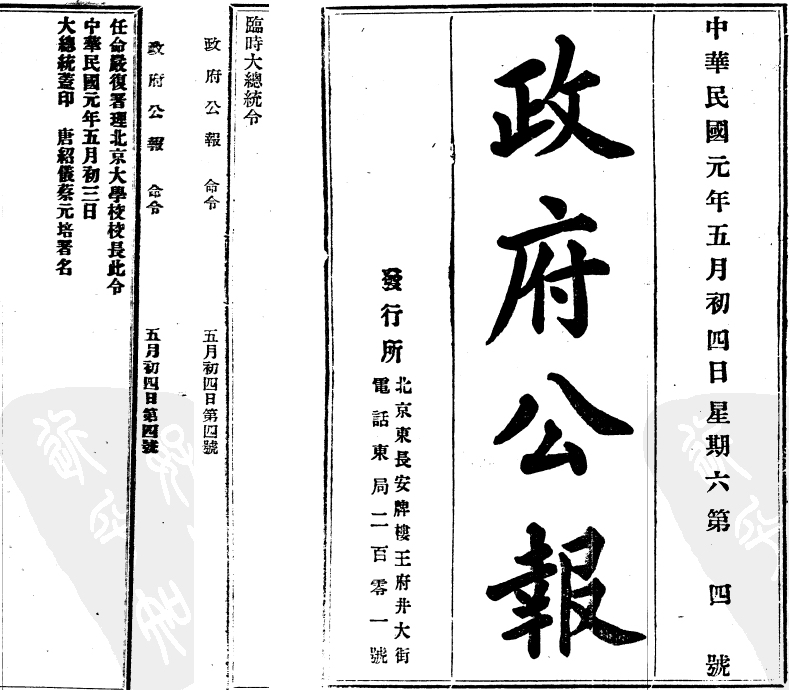
The May 4, 1912 issue of the Government Gazette with the appointment of Yan Fu as President of the newly renamed university (File photo via Duxiu)
On May 4, 1912, the appointment was published in Zhengfu Gongbao (Government Gazette, ROC). The new semester started from May 15, when Cai Yuanpei, then minster of education, spoke on the opening ceremony: "A university is where noble knowledge is studied."

The May 5, 1912 issue of the Government Gazette with the announcement of PKU's name change (File photo via Duxiu)
On December 17, 1917, PKU celebrated its anniversary for the first time since 1898, according to Beijing Daxue Jishi (Peking University Chronicle). The celebration gala featured a speech from newly-appointed President Cai Yuanpei on "20 years' evolution in China and Chinese universities," and the performance of a commemorative song, later known as the first PKU Anthem, written by Professor Wu Mei.
This time the university applied the traditional Chinese count: PKU was already 20 years old on its anniversary day of 1917.
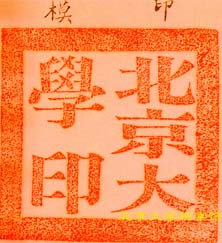
Seal of Peking University (File photo)
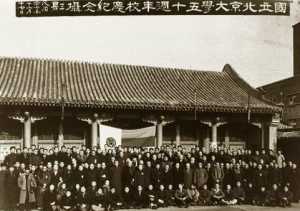
The 50th anniversary gathering (File photo/PKU Archives)
III. May 4 (1953- )
Peking University had a close historical relationship with the May Fourth Movement and New Culture Movement, not only because of its important role in the movements, but also because of the spiritual inheritance from the movements that the university has kept to this day.
As recorded in Peking University Chronicle, then PKU President Hu Shi took part in the anniversary celebration of Tsinghua University in April 1947. When he returned, President Hu suggested making May 4 as the "Xiaoyou Fanxiao Jie" (Homecoming Day for PKU alumni) because it was too cold in December and alumni could enjoy the celebration better in spring. The announcement that Peking University made May 4 as its Homecoming Day was published and spread out. On May 4, 1947, the first Homecoming Day, there were various kinds of celebration activities, such as academic lectures, music and drama evening parties. "Today is a new start and I hope you can give Peking University a chance to make it," President Hu Shi said in a speech on the first Homecoming Day.
A change of the anniversary day became more likely soon after the founding of the People's Republic. From 1949 to 1950, PKU administrative staff wrote letters to invite Chairman Mao Zedong to join the celebration activities on May 4 to commemorate the great movement on behalf of all students and teachers. Chairman Mao replied and congratulated on PKU's progress. In the two years, the anniversary day was still December 17, but celebration activities paled beside those on May 4.

Peking University Calendar (Academic years 1951-52), showing the last recorded "Dec. 17" anniversary (File photo)
On December 7, 1951, PKU Vice President Tang Yongtong suggested to change the anniversary day to May 4 because the original date was near the final examination and was quite inconvenient to both students and teachers. Though the anniversary day was still recorded as December 17 in the university calendar for academic years 1951-52, according to Beijing Daxue Rikan (Peking University Daily), setting a new anniversary day was already put on the agenda. No previously scheduled celebration activities were recorded around December 17, 1951.
The 1952-53 university calendar that was issued in September 1952 clearly put May 4 as the anniversary day.
Coincidentally or not, Yenching University's merge into PKU was also finished in September as part of China's 1952 restructuring of colleges and departments. PKU has since been situated on the former Yenching campus, or Yan Yuan.
According to Peking University Chronicle, there were bonfire evening party and a sports meeting on May 4, 1953 to celebrate the anniversary.
Both Peking University Daily and People's Daily posted articles about the 56th anniversary celebration in 1954, which coincided with the Youth Day, PKU "Homecoming Day," and 35th anniversary of the May Fourth Movement. Since then, Peking University has fixed its birthday on May 4.
As to this date changing, people gave different explanations. Most believe that the change was political in nature and the new PKU endeavored to mark a break from the old one.
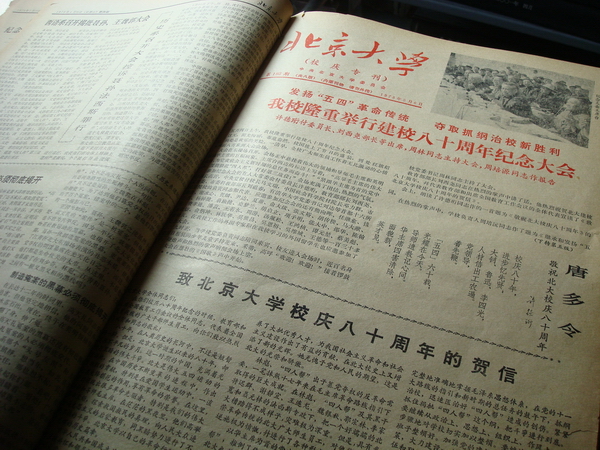
The 80th aniversary celebration (File photo/JCP News)
According to Professor Chen Pingyuan with the Department of Chinese Language and Literature, the old anniversary day was the symbol of the former education system and the new one symbolized the breaking out of the old PKU shackles. Articles about speeding up the reform of education were frequently seen in Beijing Daxue Zhoukan (Peking University Weekly) in the 1950s.
References:
Beijing Daxue Xiaoshi Yanjiushi (Office for Peking University History Research), ed. Beijing Daxue Shiliao (Peking University Historical Materials) Vol. 1. Beijing: Peking University Press, 1993.
Wang Xuezhen et al, eds. Beijing Daxue Jishi (Peking University Chronicle) (1898-1997). Beijing: Peking University Press, 2008.
Extended Reading:
【Anniversary Special】Anthems across a century
【Anniversary Special】W. A. P. Martin: Inaugural president of the Imperial University of Peking
Written by: Chen Meng
Edited by: Li Xiaomeng
Source: Agencies
Tag: Anniversary 2013